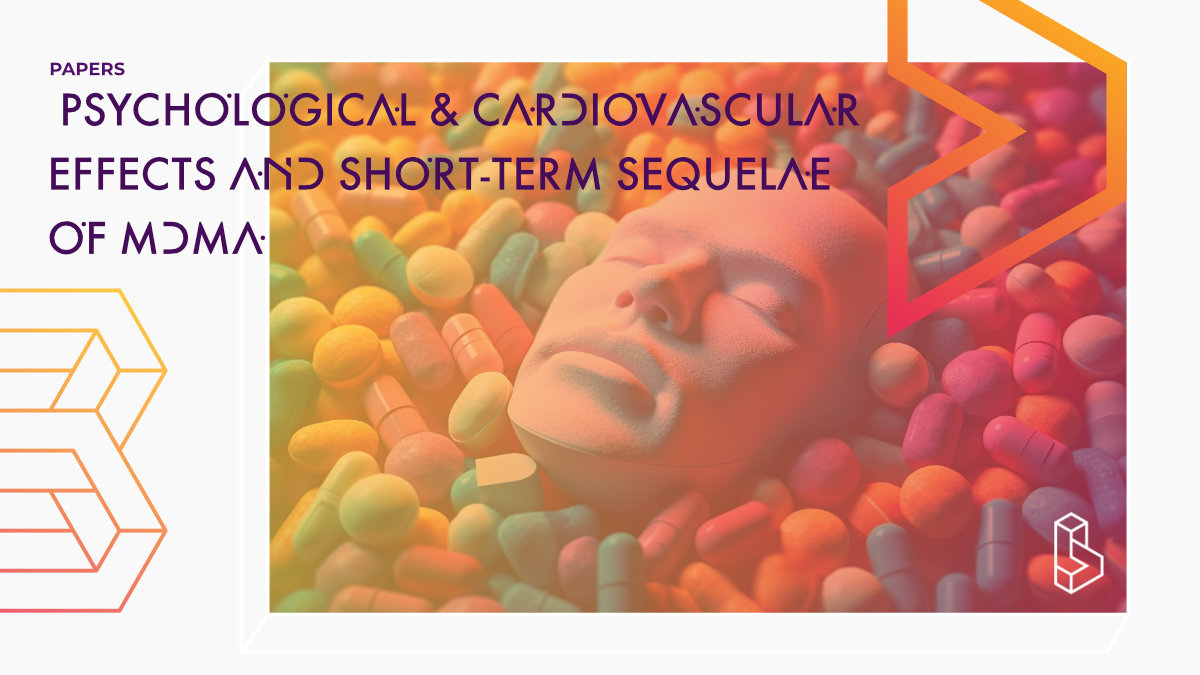The effects of a recreational dosage of MDMA (119mg/70kg) were studied in this double-blind, placebo-controlled study (n=13). The study reported the expected effects like enhanced mood and emotional sensitivity. It also reported on the hypertensive effects (high blood pressure) of MDMA that may be very relevant for making MDMA into a medicine.
Abstract of Psychological and cardiovascular effects and short-term sequelae of MDMA
“3,4-methylenedioxymethamphetamine (MDMA, “Ecstasy”) is a recreational drug reported to produce a different psychological profile than that of classic hallucinogens and stimulants. It has, therefore, been tentatively classified into a novel pharmacological class termed entactogens. This double-blind placebo-controlled study examined the effects of a typical recreational dose of MDMA (1.7 mg/kg) in 13 MDMA-naı̈ve healthy volunteers. MDMA produced an affective state of enhanced mood, well-being, and increased emotional sensitiveness, little anxiety, but no hallucinations or panic reactions. Mild depersonalization and derealization phenomena occurred together with moderate thought disorder, first signs of loss of body control, and alterations in the meaning of percepts. Subjects also displayed changes in the sense of space and time, heightened sensory awareness, and increased psychomotor drive. MDMA did not impair selective attention as measured by the Stroop test. MDMA increased blood pressure moderately, with the exception of one subject who showed a transient hypertensive reaction. This severe increase in blood pressure indicates that the hypertensive effects of MDMA, even at recreational doses, should not be underestimated, particularly in subjects with latent cardiovascular problems. The most frequent acute somatic complaints during the MDMA challenge were jaw clenching, lack of appetite, impaired gait, and restless legs. Adverse sequelae during the following 24 hours included lack of energy and appetite, feelings of restlessness, insomnia, jaw clenching, occasional difficulty concentrating, and brooding. The present findings are consistent with the hypothesis that MDMA produces a different psychological profile than classic hallucinogens or psychostimulants.”
Authors: Franz X. Vollenweider, Alex Gamma, Matthias Liechti & Theo Huber
Summary of Psychological and cardiovascular effects and short-term sequelae of MDMA
MDMA is a phenylethylamine with structural similarities to both amphetamine and mescaline. It was assigned as a Schedule I agent by the U.S. Drug Enforcement Agency in 1985. There have been ongoing controversies regarding whether MDMA is medically useful as an adjunct in psychotherapy.
MDMA is a potent indirect monoaminergic agonist. A 5-20 mg/kg subchronic regimen given twice daily for four days can lead to serotonin depletion and long-term axon terminal damage in experimental animals. However, a single recreational dose of 105-140mg/70kg is unlikely to produce long-term serotonergic deficits in humans.
During the past few years, the recreational use of MDMA has increased markedly in Western Europe and the United States. However, only three prospective studies have explored the acute psychological and physical effects of a single recreational dose of MDMA.
Find this paper
https://doi.org/10.1016/s0893-133x(98)00013-x
Open Access | Google Scholar | Backup | 🕊
Cite this paper (APA)
Vollenweider, F. X., Gamma, A., Liechti, M., & Huber, T. (1998). Psychological and cardiovascular effects and short-term sequelae of MDMA (“ecstasy”) in MDMA-naıve healthy volunteers. Neuropsychopharmacology, 19(4), 241-251.
Study details
Compounds studied
MDMA
Topics studied
Neuroscience
Safety
Study characteristics
Original
Placebo-Controlled
Double-Blind
Participants
13
Humans
Institutes
Institutes associated with this publication
University of ZurichWithin the Department of Psychiatry, Psychotherapy and Psychosomatics at the University of Zurich, Dr Mialn Scheidegger is leading team conducting psychedelic research and therapy development.
Compound Details
The psychedelics given at which dose and how many times
MDMA 119 mg
